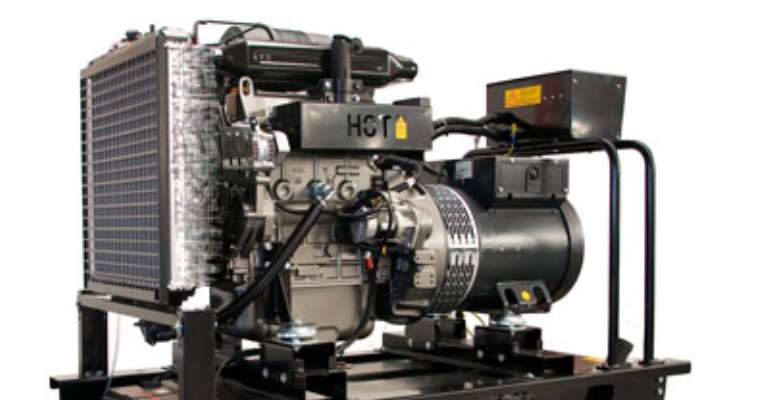Generating sets on, Discos on standby – Guardian

The recent comment by Lagos House Committee Chairman on Public Accounts, knocking the Federal Government on its tacit support of unrestrained importation of power generating sets (in the absence of an efficient public supply of electricity) has only restated the obvious: the country is a dumpsite economy, a society of anything goes and where government officials revel in cluelessness.
Sadly, the problem of unending power outage has defied, and is still defying, solutions thrown at it while the country portrays the dishonourable tag of biggest importer of power generating sets in Africa. In the process, tens of billions of dollars went down the drain from the public till, especially before acquisition of the facilities by some power generating companies (GENCOS) and distribution companies (DISCOS) in a government privatization bid.
The lawmaker's observation that, among other crushing factors, dealers of generating sets capitalise on lapses of government and hide under the importation regime to frustrate electricity supply in the country can hardly be faulted. However, his advice to the authorities to divorce politics from power generation, citing the failure of ENRON project scuttled in Lagos during the Obasanjo administration may be coming too late following the privatization exercise.
It is certainly troubling, as the lawmaker, Bolaji Ayinla reiterated, that majority of Nigerians live below one dollar per day because of epileptic power supply which blocks job opportunities, just as many people could not work independently. The manufacturing sector has almost collapsed due to the woeful performance of the power sector which remained comatose unceasingly for about two decades; thus exposing the country's leaders' lack of vision, coupled with sheer insensitivity to the plight of citizens. His damning verdict: 'The truth is that the government is not ready to assist its citizens,' tells it all.
Activities of importers too are worrisome as they strangulate the economy and ensure that every household, business unit - from small through medium to large - has virtually become an independent power producer as a survival (defensive) mechanism.
Many businesses have suffered by way of forced reduction in staff strength, while many have folded up, having been choked to death by unfavourable economic climes. The result: increasing number of able workers in the labour market. Nigeria's indiscretion to be import dependent on generators becomes a big boost to economies like China, Japan and the United Kingdom among others.
In apparent response to the deteriorating power situation in the country, which invariably gave rise to the unprecedented demand for power generating sets, a report last year indicated that Nigerian businesses spent a whopping $8.2 million (about N1.180 billion) on importation of power generating sets in the first week of January alone.
Investigations had revealed that during the regime of the privatized public power supply company, PHCN, 15 firms purchased $8.2 million in one week from the Central Bank of Nigeria (CBN) to import generating sets, a claim supported by a CBN report on foreign exchange sales under the Retail Dutch Auction System (RDAS) for that week.
Last year too, global research firm GBI Research published a not-too-encouraging data on the generator importation regime, claiming that importation of the sets was expected to consume about N151.16 billion ($950.7 million) by the year 2020. The research suggests that Nigeria, which is the largest market for diesel and gas generating sets in Africa, may witness growth rates of 8.7 per cent driving up market volume from N71.55 billion ($450 million) in 2011, to reach N151.16 billion ($950.7 million) by 2020.
GBI Energy Analyst in that report stated that 'The Nigerian market provides considerable opportunities for generating set manufacturers, with good growth recorded between 2006 and 2011, although it experienced a slight decline in 2009 after reaching a peak of N65.476 billion ($411.8 million) in 2008…The extent of market growth for gas generating sets in Nigeria depends upon the timely implementation of a gas infrastructure in the country.
'In 2007, only around 15 of the 79 power stations in Nigeria were fully functioning.' Most of the power stations were built in the 1970s and 1980s.
Curiously, the firm's claims which are yet to be officially debunked added: 'Nigeria's generator market grew at a Cumulative Annual Growth Rate (CAGR) of 5.6 per cent between 2006 and 2011, reaching $450 million, despite experiencing a slight decline in 2009 due to the global economic recession. Growth of the market, however, improved in 2010 and 2011.'
It is instructive that highly placed government officials are equally guilty of the abuse of generating sets importation to drive their excessive taste, all at the expense of the people whose welfare they are mandated to improve.
Typical of successive administrations, promises that are never kept have become the hallmark of governance. For instance, Nigerians have patiently waited for an emergency to be declared in the sector, only to be fed with award of billions of dollar contracts showcasing funds that end up oiling wheels of corruption among the elite.
As long as the privatized firms grapple with inherited degenerative problems of the power sector, so long will the corruption-driven import regime continue to the advantage of a few and eternal dislocation of most hapless Nigerians waiting for 'substantial improvement in supply and stability' that President Goodluck Jonathan pledged.
